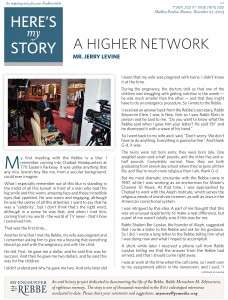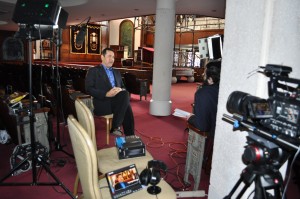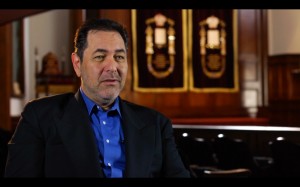HMS: A higher network
My first meeting with the Rebbe is a blur.
I remember coming into Chabad Headquarters at 770 Eastern Parkway. It was unlike anything that any nice Jewish boy like me, from a secular background, could ever imagine.
What I especially remember out of this blur is standing in the midst of all this tumult in front of a man who had this big smile and this warm, amazing face and these incredible eyes that sparkled. He was warm and engaging, although he was the center of all this attention. I want to say that he was a “celebrity,” but I don’t think that’s right word, although in a sense he was that, and when I met him, coming from my world – the world of TV news – that’s how I perceived him.
That was the first time…
Another time that I met the Rebbe, my wife was pregnant and I remember asking him to give me a blessing that everything should go well with the pregnancy and with the child
He did. First, he gave me a dollar, and he said this was for success. And then he gave me two dollars, and he said this was for the children.
I didn’t understand why he gave me two. And only later did I learn that my wife was pregnant with twins. I didn’t know it at the time.
During the pregnancy, the doctors told us that one of the children was struggling with getting nutrition in the womb – he was much smaller than the other – and that they might have to do an emergency procedure. So I wrote to the Rebbe.I received an answer back from the Rebbe’s secretary, Rabbi Binyomin Klein. I was in New York so I saw Rabbi Klein in person and he said to me, “Do you want to know what the Rebbe said when I gave him your letter? He said ‘Eh!’ and he dismissed it with a wave of his hand.”
So I went back to my wife and I said, “Don’t worry. We don’t have to do anything. Everything is gonna be fine.” And thank G-d, it was.
The twins were not born early; they were born late. One weighed seven-and-a-half pounds, and the other five-and-a-half pounds. Completely normal. Now, they are both graduating from Jewish day school where they’ve gone all their life, and they’re much more religious than I am, thank G-d.
But my most dramatic encounter with the Rebbe came in 1987, while I was working as an anchorman for Miami’s Channel 10 News. At that time, I was approached by Chabad to work with Aleph Institute, which serves the religious needs of Jewish servicemen, as well as Jews in the American correctional system.
I was intrigued by this idea. A part of me thought that this was an unusual opportunity to make a real difference, but a part of me wasn’t totally sure if this was for me.
Rabbi Shalom Ber Lipskar, the founder of Aleph, suggested that I write a letter to the Rebbe and ask for his guidance. So I did. I wrote a long letter to the Rebbe telling him what I was doing now and what I hoped to accomplish.
A short while later I received a phone call from Rabbi Lipskar telling me that the answer from the Rebbe had arrived, and that I should come right away.
I was at work at the time when the call came, so I went over to my assignment editor in the newsroom, and I said, “I have an emergency, I have to leave.” I took off and I came to Rabbi Lipskar’s office. I remember that when I walked in he was seated behind his desk, studying this little piece of paper with great intensity. And he said, “I’m very puzzled by this answer. I can’t figure it out although I’ve been trying to for a long time.”
“What does it say?”
“It says: ‘Tell me all your names.’”
This was the answer, but clearly not the answer that I had been expecting. I had been expecting some kind of intellectual answer to my question, but not this. This was totally out of the box. Tell me all your names?
So I asked Rabbi Lipskar, “What does it mean?”
He had no idea, but he offered, “Maybe it means that the Rebbe somehow doesn’t recognize your soul or something. Maybe you should ask you mother what your Hebrew name is.”
Now, I was positive that I knew my Hebrew name – Yosef. And I had signed the letter to the Rebbe with it, followed by my father’s name – Yosef ben Tzvi Hersh Leib HaLevi. But I agreed to ask my mother, even if I felt all this was silly in a way.
So, immediately from Rabbi Lipskar’s office, I went to see my Mom and I told her what happened. Hearing this story, my mother was just as perplexed as I was.
I said, “I know, it doesn’t make any sense. I know my Hebrew name – it’s Yosef.”
She agreed, “Yes. Yosef Mordechai.”
I said, “What?!”
She repeated it, “Yosef Mordechai.”
“Mordechai? You never told me that!” I replied incredulously.
I went back to Rabbi Lipskar and told him that my name was not Yosef but Yosef Mordechai ben Tzvi Hersh Leib HaLevi. And he said, “Write another letter to the Rebbe and sign it with this name.”
I wrote another letter asking if I should leave my job and go to work for the Aleph Institute. And I got an answer, which said, “Ask your best friend what that person thinks.” So I asked my mother who I felt was my best friend. We talked it over, and eventually I went to work for Aleph Institute.
Thinking it over now, years later, I just want to say what I took away from this experience:
Any other Jewish leader, who got a letter from an anchorman for a major TV station wanting to go into public service, would have thought: What is the marketing potential for our organization here? How could this person help us with video news releases or press coverage? In what manner can this person help our organization grow?
But the Rebbe wasn’t thinking about any of that.
The Rebbe was thinking: Here’s a Jewish boy that doesn’t know his name.
So I felt like the Rebbe was in a completely different category and was a totally different kind of leader, one who – no matter how far away you were from him – was still able to reach through the ether and touch you on a very, very profound level.
Jerry Levine is an Emmy-Award winning anchorman. He gave up his high profile anchor position in Miami to pursue non-profit film making focused on humanitarian films and documentaries. He was interviewed in Miami in April, 2011.
This week’s Here’s My Story is dedicated
In honor of our dear parents
Moshe Melech and and Gutte. By Leah and Moshe








No Comments to “HMS: A higher network”